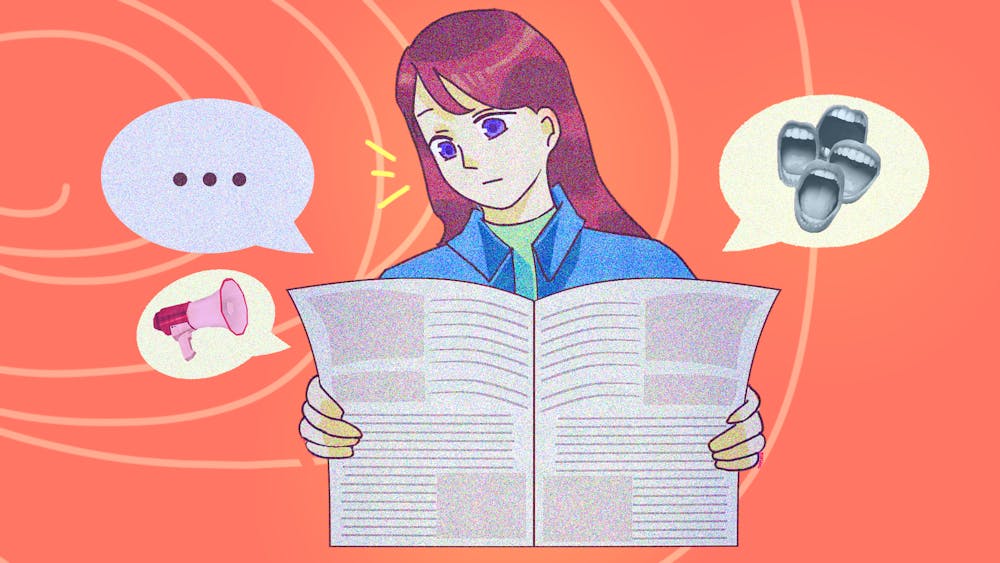
Plato first expressed his doubts about the reliability of the written word in 350 B.C., and when the printing press was invented, it seemed that his fears had come to life. Throughout the 17th century, the press overflowed with Parliamentarian vitriol. Polemics have infested the news since: The gazettes circulating during the days of our Founding Fathers were beacons of political motive and took even littler care than their predecessors to differentiate fact from fiction. The opposite editorial, named for its position within the paper, was conceived to demand honesty from news reporters — an attempt at committing to neutrality in the media. No longer would our news be a puppet tugged in all directions; there would now be a section specifically dedicated to voicing and exchanging thoughts. The opinion section has, since its birth, been a reader favorite and reliable inclusion in newspapers across the world.
In late October, billionaire owner of The Washington Post Jeff Bezos blocked the op-ed team’s attempted endorsement of Kamala Harris, marking the first time in 36 years that the Post has abstained from supporting a presidential candidate. Amongst those who applauded Bezos’ veto, many felt that the vocal outrage of the Post writers was out of line and even began to question the place of Opinion in news reporting. Some American readers, once looking for a political voice partitioned off from mainstream news, now complain that this section itself is too partisan. This leads us to ask: Is there any true reason for op-ed columns? What purpose did we think “Opinion” served in the first place?
Perhaps there really is no public benefit of the circulation of op-eds, and our kind is simply biologically hardwired to be invested in what one another has to say. In “Sapiens: A Brief History of Humankind,” Yuval Noah Harari hypothesizes that our species has a natural tendency to share, and remember, one another’s thoughts; the ability to agree, and also to disagree, may be what granted us our longevity. This social inclination allowed us to form the tribes and kingdoms necessary for survival and remains all around us to this day. Nothing seems to be able to inflame a person more than another’s unsavory take on their best friend, partner, or child. The need for, and reactivity to, others’ perspectives is all that Opinion is about.
Here we might compare the cross-generational embrace of social media: If one relishes mucking about in the gutters of Instagram, one should also be, by direct association, an avid fan of Opinion. Reading published Opinion pieces and scrolling through comment sections scratch the same human itch, and to insist — because the Post’s incipient endorsement was at odds with one’s personal views — that op-eds should be eliminated is just another petulant opinion. Are all of today’s respected newspapers not borne of the primitive desire to trumpet about, and form bands on, subjectively meaningful topics? Objectivity is a goal reserved for the other sections of the newspaper.
Funnily enough, those who claim the endorsement would have compromised the integrity of the Post seem to take no issue with Bezos’ mandated silence. If one’s concern were truly for the health of unbiased media, how could one not be outraged that the entirety of the Post must bend backwards to cater to a billionaire’s every whim? The sudden, retroactive questioning of op-eds seems to be based on little more than sulky disagreement; it just so happens that, this time, corporatist interests aligned with a select portion of reader values.
Jeff Bezos himself published an op-ed at the Post not long after, complaining about the lack of trust in the media (again: after having just single-handedly stifled the voices of an entire department). He assured us that there is no “quid pro quo” at play and that lack of media credibility can somehow be remedied by abstention from contentious political topics. Herein lies the glory of the op-ed: It’s entirely your choice, as the esteemed reader, to decide what you think of Bezos’ thinking.
Centuries ago, while our Neanderthal cousins wrestled bison, we sat in the bushes with our enlarged brains, blathering. Today, our clannishness manifests itself in our magazine subscriptions, clothing choices, and political affiliations. Somewhere along the way, the op-ed was invented and then gradually misunderstood, until it was labeled as naught but another means of political indoctrination. No outlet ever claimed that their op-eds contained information that was objectively, or even subjectively, valuable. The bottom line was always that someone cared. Whether you’re a nobody or the Ethicist himself, there is another human who, whether they’re aware or not, minds what your two cents are.
GLADYS SMITH is a College sophomore from Williamsburg, Va. Her email is gldysmth@sas.upenn.edu.
The Daily Pennsylvanian is an independent, student-run newspaper. Please consider making a donation to support the coverage that shapes the University. Your generosity ensures a future of strong journalism at Penn.
Donate




